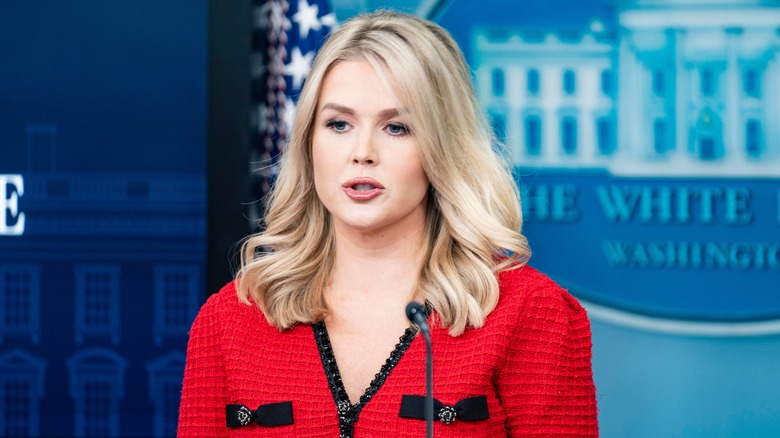America has always had public scandals, but in the social media era, one viral video can transform an ordinary person into a symbol of national outrage. That’s exactly what happened with the woman now known as “Phillies Karen.” What began as a heated altercation at a baseball game exploded into a full-blown cultural phenomenon—one that culminated in her tearful vow to leave the United States forever. But just as sympathy began to surface for a woman seemingly crushed under the weight of viral infamy, a shocking twist emerged: Karoline Leavitt, the rising conservative commentator and former White House press aide, inserted herself into the debate with a controversial statement that has left America stunned, divided, and asking uncomfortable questions.
The Viral Meltdown That Started It All
The original clip was just 47 seconds long. It showed a woman at a Phillies game screaming at fellow fans, berating security, and refusing to calm down. To some, she was the perfect caricature of entitlement—red-faced, loud, and unrepentant.

Within hours, the internet crowned her “Phillies Karen,” lumping her into the ever-expanding category of viral “Karen” videos that depict women (often white, often in public spaces) behaving badly. TikTok creators parodied her meltdown, Twitter users crafted mocking memes, and late-night comedians delivered punchlines at her expense.
But the viral storm did not stop at mockery. Strangers online dug into her personal life. She was doxxed, harassed, and reportedly lost her job. Neighbors turned against her. The woman who had been a private citizen just days before was now a national symbol of entitlement and shame.
The Tearful Exit: “I Can’t Stay Here Anymore”
Weeks later, standing outside her home in suburban Philadelphia, she faced reporters with trembling hands and tear-filled eyes. Her voice cracked as she made an extraordinary announcement:
“I can’t stay here anymore. I’ve been treated horribly unfairly—by strangers online, by my community, by the media. Everyone thinks they know me, but they don’t. I can’t live like this. I’m leaving the country, and I will never come back.”
The declaration stunned many. For some, it felt melodramatic—a desperate attempt to cast herself as a victim rather than someone facing the consequences of her actions. For others, it was heartbreaking evidence of the devastating impact digital mobs can have on a person’s mental health and livelihood.
Online, hashtags like #GoodbyeKaren and #JusticeForKaren trended simultaneously, illustrating the nation’s deep divide: was she a villain finally facing justice, or a scapegoat destroyed by an unforgiving internet?
Karoline Leavitt Enters the Arena
Then came the twist. Karoline Leavitt, a fast-rising conservative voice known for her fiery rhetoric and sharp media instincts, addressed the controversy during a town hall event. Her comments took many by surprise.

“I’ve seen the videos, I’ve seen the coverage, and I’ve seen the endless ridicule. Here’s the truth: I will always defend myself and my reputation, but I won’t hide behind tears. Too many people in this country mistake criticism for persecution. If you behave badly in public and people call you out, that’s accountability—not cruelty. If you want to leave America, that’s your choice. But don’t expect the rest of us to rewrite the truth to make you feel better.”
The remarks landed like a political grenade. Unlike others who mocked or pitied “Phillies Karen,” Leavitt reframed the debate. Her intervention turned what might have remained a fleeting viral scandal into a broader referendum on accountability, victimhood, and the nature of fairness in modern America.
A Cultural Divide Laid Bare
Leavitt’s statement instantly polarized the country. Her supporters hailed her candor, praising her for saying what many felt but were too hesitant to voice. In their view, America has developed a culture of victimhood—where accountability is dismissed as “unfair treatment” and public consequences are met with tearful self-pity.
Her critics, however, accused her of cruelty. They argued that whatever “Phillies Karen” had done in that stadium, the relentless doxxing, threats, and humiliation she endured far outweighed the original offense. To them, Leavitt’s comments reflected a lack of compassion, a refusal to acknowledge the psychological toll of viral infamy.
The debate quickly transcended the individual story. It became a cultural flashpoint, raising uncomfortable questions: Is public shaming ever justified? When does accountability cross into harassment? And has America grown too eager to consume human downfall as entertainment?
The Role of the Media: Watchdog or Exploiter?
Central to this controversy is the role of the media. The press did not just report on “Phillies Karen”; it amplified her humiliation. Networks replayed the video endlessly, podcasts dissected it for laughs, and columnists framed her as a symbol of entitlement.
Critics argue this amounts to exploitation, turning a woman’s personal crisis into clickbait. Others counter that the media merely reflected public interest—after all, it was social platforms that first catapulted the video into virality.
This tension—between reporting responsibly and chasing ratings—mirrors a larger dilemma in modern journalism: where does accountability end and exploitation begin? And is the media reflecting society’s hunger for outrage, or actively feeding it?
Karoline Leavitt’s Strategic Positioning
Leavitt’s remarks should not be seen in isolation. As a young political figure carving out a national profile, she has built her brand on bluntness, unapologetic defenses of conservative values, and an ability to seize cultural flashpoints.





